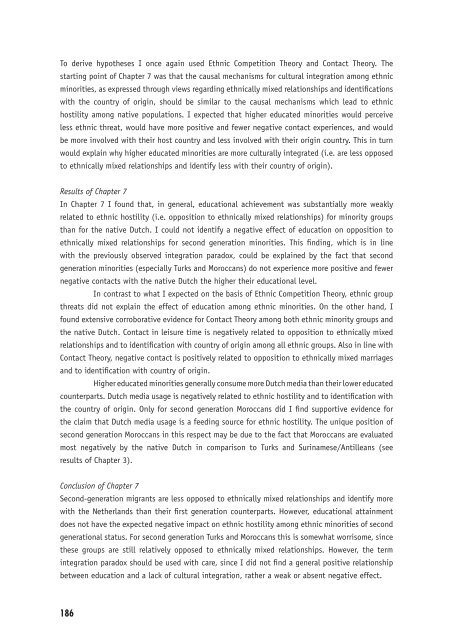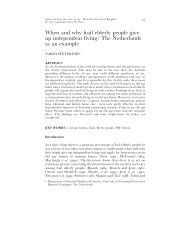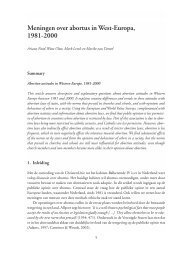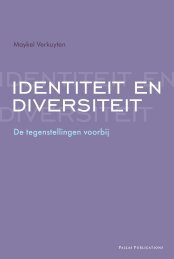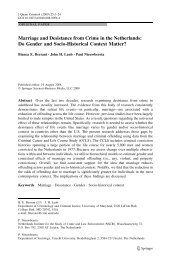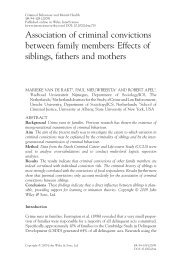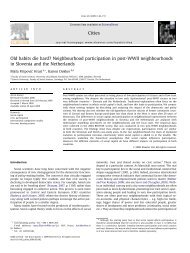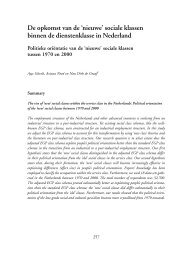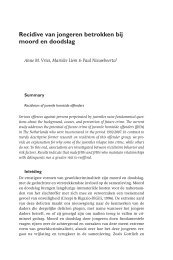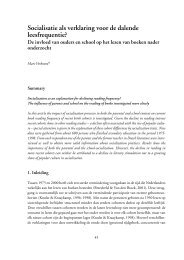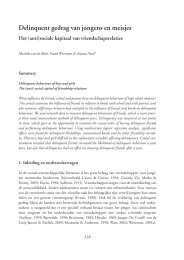Ethnic Hostility among Ethnic Majority and Minority Groups
Ethnic Hostility among Ethnic Majority and Minority Groups
Ethnic Hostility among Ethnic Majority and Minority Groups
Create successful ePaper yourself
Turn your PDF publications into a flip-book with our unique Google optimized e-Paper software.
To derive hypotheses I once again used <strong>Ethnic</strong> Competition Theory <strong>and</strong> Contact Theory. The<br />
starting point of Chapter 7 was that the causal mechanisms for cultural integration <strong>among</strong> ethnic<br />
minorities, as expressed through views regarding ethnically mixed relationships <strong>and</strong> identifi cations<br />
with the country of origin, should be similar to the causal mechanisms which lead to ethnic<br />
hostility <strong>among</strong> native populations. I expected that higher educated minorities would perceive<br />
less ethnic threat, would have more positive <strong>and</strong> fewer negative contact experiences, <strong>and</strong> would<br />
be more involved with their host country <strong>and</strong> less involved with their origin country. This in turn<br />
would explain why higher educated minorities are more culturally integrated (i.e. are less opposed<br />
to ethnically mixed relationships <strong>and</strong> identify less with their country of origin).<br />
Results of Chapter 7<br />
In Chapter 7 I found that, in general, educational achievement was substantially more weakly<br />
related to ethnic hostility (i.e. opposition to ethnically mixed relationships) for minority groups<br />
than for the native Dutch. I could not identify a negative effect of education on opposition to<br />
ethnically mixed relationships for second generation minorities. This fi nding, which is in line<br />
with the previously observed integration paradox, could be explained by the fact that second<br />
generation minorities (especially Turks <strong>and</strong> Moroccans) do not experience more positive <strong>and</strong> fewer<br />
negative contacts with the native Dutch the higher their educational level.<br />
In contrast to what I expected on the basis of <strong>Ethnic</strong> Competition Theory, ethnic group<br />
threats did not explain the effect of education <strong>among</strong> ethnic minorities. On the other h<strong>and</strong>, I<br />
found extensive corroborative evidence for Contact Theory <strong>among</strong> both ethnic minority groups <strong>and</strong><br />
the native Dutch. Contact in leisure time is negatively related to opposition to ethnically mixed<br />
relationships <strong>and</strong> to identifi cation with country of origin <strong>among</strong> all ethnic groups. Also in line with<br />
Contact Theory, negative contact is positively related to opposition to ethnically mixed marriages<br />
<strong>and</strong> to identifi cation with country of origin.<br />
Higher educated minorities generally consume more Dutch media than their lower educated<br />
counterparts. Dutch media usage is negatively related to ethnic hostility <strong>and</strong> to identifi cation with<br />
the country of origin. Only for second generation Moroccans did I fi nd supportive evidence for<br />
the claim that Dutch media usage is a feeding source for ethnic hostility. The unique position of<br />
second generation Moroccans in this respect may be due to the fact that Moroccans are evaluated<br />
most negatively by the native Dutch in comparison to Turks <strong>and</strong> Surinamese/Antilleans (see<br />
results of Chapter 3).<br />
Conclusion of Chapter 7<br />
Second-generation migrants are less opposed to ethnically mixed relationships <strong>and</strong> identify more<br />
with the Netherl<strong>and</strong>s than their fi rst generation counterparts. However, educational attainment<br />
does not have the expected negative impact on ethnic hostility <strong>among</strong> ethnic minorities of second<br />
generational status. For second generation Turks <strong>and</strong> Moroccans this is somewhat worrisome, since<br />
these groups are still relatively opposed to ethnically mixed relationships. However, the term<br />
integration paradox should be used with care, since I did not fi nd a general positive relationship<br />
between education <strong>and</strong> a lack of cultural integration, rather a weak or absent negative effect.<br />
186


